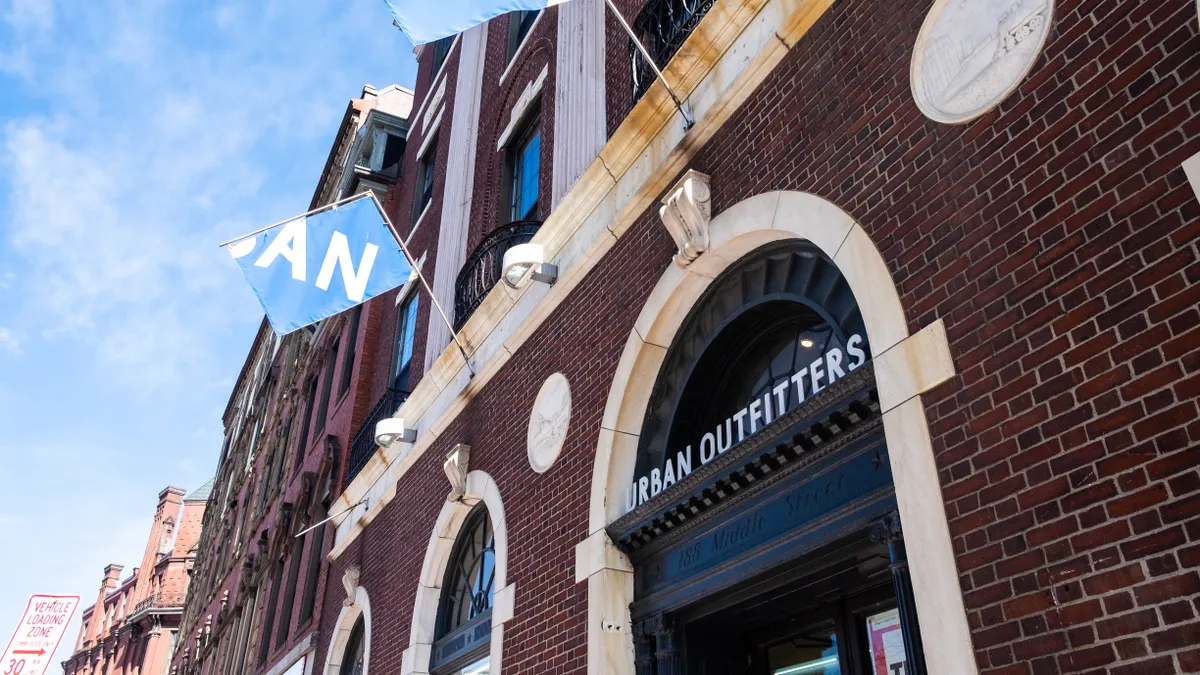Apparel retailers, like all nonessential retailers, for much of the first quarter were forced to lock up their physical stores in order to help stymie the spread of COVID-19. In recent days as their stores open back up, several have touted surges in online sales, and in some cases better-than-expected results from reopened stores.
That mostly means that expectations were low, as consumers remain somewhat wary of shopping in stores. Macy's, like other department stores, has product offerings that heavily rely on apparel. The retailer on Tuesday said reopened locations "are performing better than anticipated," and told Cowen analysts later in the day that meant on average they've brought in about 50% of their usual sales, across various geographies and store types. American Eagle Outfitters CEO Jay Schottenstein in a statement last week said he was "very pleased to see stores re-opening strong," setting up its namesake and Aerie lingerie brands well for the back-to-school and fall seasons. Abercrombie & Fitch Co. last month said that sales productivity at reopened U.S. stores is at 80%.
With stores closed for much of the period, retailers scrambled to boost online sales by offering curbside pickup and store-based fulfillment, and almost all reported increases. Chico's on Wednesday said first quarter digital sales exceeded the same period last year, with a double-digit increase in April, while overall net sales fell 45.9%. Urban Outfitters, where retail sales decreased 28% and wholesale decreased 74%, saw "low double-digit growth in the digital channel." Abercrombie & Fitch Co. said overall sales fell 34% but rose 25% in e-commerce. Nordstrom said first quarter e-commerce rose 5% to $1.1 billion, with new online customer growth of more than 50%. Macy's this week, in releasing a preliminary look at its first quarter, called e-commerce in the period "strong."
There were some exceptions. Victoria's Secret last month said first quarter digital sales fell 15% to $307.6 million, partially driven by a six-day closure of the website. In April, with the site up and stores closed, e-commerce rose 30%. At Gap Inc. overall net sales fell 43% and e-commerce rose 13% overall, and, at Old Navy, store sales fell 60% and online sales rose 20%. The brand's online traffic was down from last year, although its site conversion rate was 10% in April, which led to 26% more transactions year over year, according to a report from SimilarWeb. But namesake Gap store sales fell 64% and online sales were also down 5%, and Banana Republic store sales fell 61% while online sales fell 2%.
E-commerce volumes couldn't make up for the massive downturn in sales, but their other downside is added costs. Urban Outfitters, for example, noted that its delivery expense in the quarter "increased primarily due to the increase in penetration of the digital channel, lower average order value and an increase in split shipments."
In general, gross margins plummeted in the pandemic period. Chico's gross margin was underwater by $11.1 million or negative 4% of net sales, compared to $190.8 million, or 36.9% of net sales last year. American Eagle's gross margin rate was 5.1% in the quarter, from 36.7% last year.
While the pandemic makes first quarter apparel sales results an aberration, apparel retailers do seem laser-focused on productivity going forward. That will be a challenge if e-commerce sales continue to grow, considering the particular difficulties and cost of that channel for the segment. When it comes to brick and mortar, however, many seem more willing to let go of underperforming locations.
Gap Inc. CFO Katrina O'Connell recently told analysts that the company is leveraging the situation wrought by COVID-19 and exacerbated by civil unrest in some areas to renegotiate leases. In some cases where that's unsuccessful, stores will permanently close, mostly at Gap, she said. Nordstrom last month announced plans to close 16 full-line department stores and all three of its luxury Jeffrey stores. Nine Chico's stores closed permanently in the first quarter (for a total of 84 since last year's first quarter), and the company said it expects to close another 50 to 60 permanently over the rest of the fiscal year, adding, "[W]ith the disruption we have seen from the pandemic, we intend to re-evaluate each location's future viability and modify our closure plans accordingly."
Victoria's Secret will close 250 stores in North America, with the fate of its U.K. stores unknown, as the brand is in the equivalent of bankruptcy there, a significant shrinkage that BMO Capital Markets Managing Director Simeon Siegel says is key to any possible future success.
Macy's, a retailer that some analysts say needs a drastic reduction to its footprint, is sticking to its plans developed before the COVID-19 pandemic became an issue, and may even be slowing that down. The company has permanently shuttered 28 of the 125 stores it set for closure over the next three years as part of its now-delayed turnaround, according to Cowen & Co.'s note on its Tuesday conference with CEO Jeff Gennette. The department store "has identified the remaining ~100 stores it plans to close, but is taking a more cautious approach to timing," Cowen said.
























